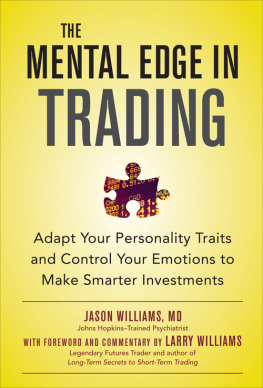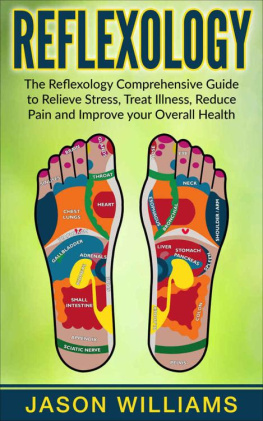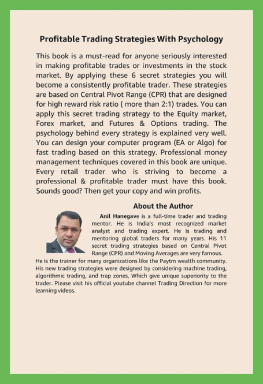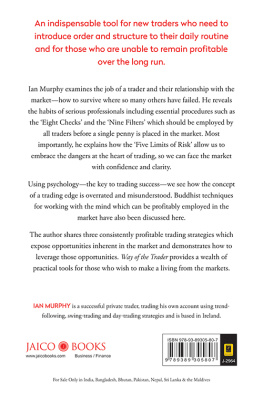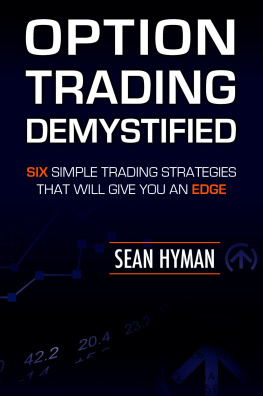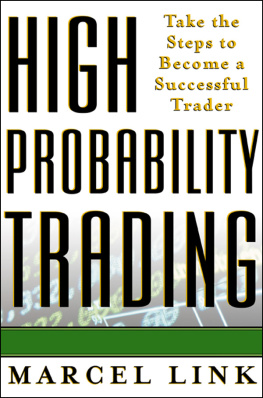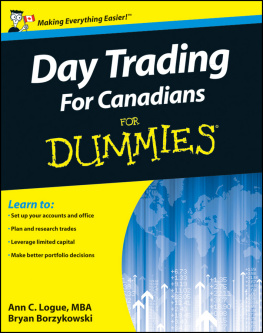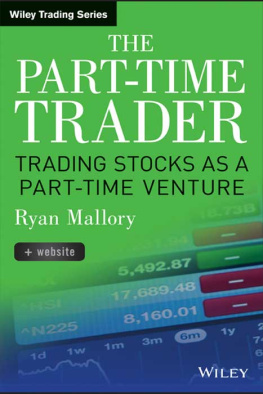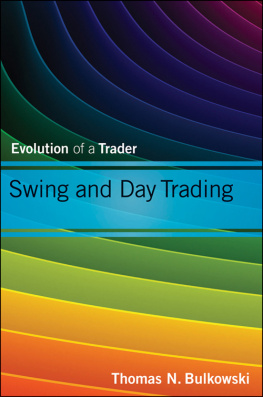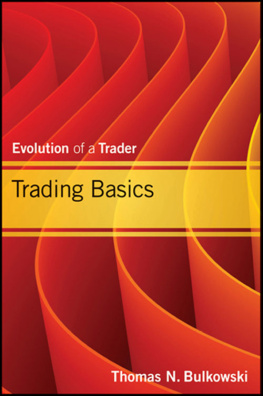
THE
MENTAL
EDGE IN TRADING
Adapt Your Personality Traits
and Control Your Emotions
to Make Smarter Investments
JASON WILLIAMS, MD
with Foreword and Commentary by
LARRY WILLIAMS


Copyright 2013 by Jason Williams. All rights reserved. Printed in the United States of America. Except as permitted under the United States Copyright Act of 1976, no part of this publication may be reproduced or distributed in any form or by any means, or stored in a data base or retrieval system, without prior written permission of the publisher.
e-ISBN: 978-0-07-179941-6
e-MHID: 0-07-179941-9
All trademarks are trademarks of their respective owners. Rather than put a trademark symbol after every occurrence of a trademarked name, we use names in an editorial fashion only, and to the benefit of the trademark owner, with no intention of infringement of the trademark. Where such designations appear in this book, they have been printed with initial caps
McGraw-Hill eBooks are available at special quantity discounts to use as premiums and sales promotions, or for use in corporate training programs. To contact a representative please e-mail us at bulksales@mcgraw-hill.com
TERMS OF USE
This is a copyrighted work and The McGraw-Hill Companies, Inc. (McGraw-Hill) and its licensors reserve all rights in and to the work. Use of this work is subject to these terms. Except as permitted under the Copyright Act of 1976 and the right to store and retrieve one copy of the work, you may not decompile, disassemble, reverse engineer, reproduce, modify, create derivative works based upon, transmit, distribute, disseminate, sell, publish or sublicense the work or any part of it without McGraw-Hills prior consent. You may use the work for your own noncommercial and personal use; any other use of the work is strictly prohibited. Your right to use the work may be terminated if you fail to comply with these terms.
THE WORK IS PROVIDED AS IS. McGRAW-HILL AND ITS LICENSORS MAKE NO GUARANTEES OR WARRANTIES AS TO THE ACCURACY, ADEQUACY OR COMPLETENESS OF OR RESULTS TO BE OBTAINED FROM USING THE WORK, INCLUDING ANY INFORMATION THAT CAN BE ACCESSED THROUGH THE WORK VIA HYPERLINK OR OTHERWISE, AND EXPRESSLY DISCLAIM ANY WARRANTY, EXPRESS OR IMPLIED, INCLUDING BUT NOT LIMITED TO IMPLIED WARRANTIES OF MERCHANTABILITY OR FITNESS FOR A PARTICULAR PURPOSE. McGraw-Hill and its licensors do not warrant or guarantee that the functions contained in the work will meet your requirements or that its operation will be uninterrupted or error free. Neither McGraw-Hill nor its licensors shall be liable to you or anyone else for any inaccuracy, error or omission, regardless of cause, in the work or for any damages resulting therefrom. McGraw-Hill has no responsibility for the content of any information accessed through the work. Under no circumstances shall McGraw-Hill and/or its licensors be liable for any indirect, incidental, special, punitive, consequential or similar damages that result from the use of or inability to use the work, even if any of them has been advised of the possibility of such damages. This limitation of liability shall apply to any claim or cause whatsoever whether such claim or cause arises in contract, tort or otherwise.
To the three joys in my life: Richard, Violet, and Sylva.
I love you each infinitely.
CONTENTS
Chapter 1
The Human Mind: A Primer
Chapter 2
How Does the Brain Generate the Mind?
Chapter 3
Anatomy of the Brain 101
Chapter 4
The Four Perspectives of Mental Life
Chapter 5
Introduction to Personality Traits
Chapter 6
Where Does Personality Come From?
Chapter 7
Personality Inventories
Chapter 8
Introduction to the NEO PI-R
Chapter 9
The Five-Factor Model in Detail
Chapter 10
The 30 Personality Facets
Chapter 11
General Interpretation of NEO-AC Scores
Chapter 12
Personality Styles
Chapter 13
Personality Disorders
Chapter 14
Neuroticism and Trading
Chapter 15
CBT for Traders
Chapter 16
Risk Aversion and Trading
Chapter 17
Conscientiousness and Trading
Chapter 18
Optimism and Trading
Chapter 19
Excitement-Seeking and Trading
Chapter 20
The Secret to Happiness
Chapter 21
The Overly Dependent Trader
Chapter 22
A Case Study: Larry Williams
Chapter 23
Personality Case Study: Dan Zanger
Chapter 24
Personality Case Study: KD Angle
Chapter 25
Personality Case Study: Linda Raschke
Chapter 26
Personality Case Study: Andrea Unger
Chapter 27
Personality Case Study: Ralph Vince
Chapter 28
Personality Case Study: Scott Ramsey
Chapter 29
Case Study: The Perfect Trader
Chapter 30
The Addictive Personality
Chapter 31
Conclusions
As parents we like to think that our children will learn lifes lessons from us. We dont often think we learn much from them; weve been there, done that. Our purpose is to break the ice, to show them the way. This book, by my son Dr. Jason Williams, turns that notion upside down for me.
While I have been trading the markets for some 50 years now, in this book I learned from my son. The child was the teacher. The first thing I learned is that in order to change taking incorrect action and not changing detrimental habits, we really do need to know ourselves.
Without knowing yourself, how can change occur?
I kind of thought I knew most of the things about the market as well as my own personality as a trader. I was flat out wrong. When I took the personality profile test that Jason gave me, I immediately learned my strengths and weaknesses. What surprised me was that I had never realized any of these points before.
I always knew I could develop great mechanical trading systems, but could never figure out why I had such a hard time trading or following them myself. My best trading has almost always come from a much more freestyle form of trading, something that cant be bottled up or reduced to a single mathematical formula. It was not until I took the personality test that I understood why I can develop good systems but simply had problems following them.
What I found was that the shoe didnt fit. While intellectually I can develop systems, my personality is not one to follow them. That was a real breakthrough for me as it crystallized the best possible trading strategy for me. I was able to find the shoe that fits. That realization, as to how I function as a trader, also taught me how I can best use mechanical trading systems. This was a double win for me; I learned my best personal trading strategy as well as how to best use trading systems!
When they were shown to me, that was very much an A-ha! experience. I instinctively and intuitively knew those were the areas that made me a good trader as well as the areas I needed to work on.
Risk has never bothered me, so I have not been afraid to take trades. The test confirmed that. What I didnt know was that my largest trading weaknesses have been my lack of paying attention to detail. Clearly Im not the worlds best detail person, not even close, but I never realized until reading Jasons work and understanding my personality how much of a hindrance that was to making my trading even more successful.
Next page
